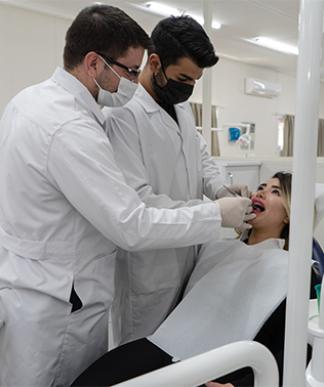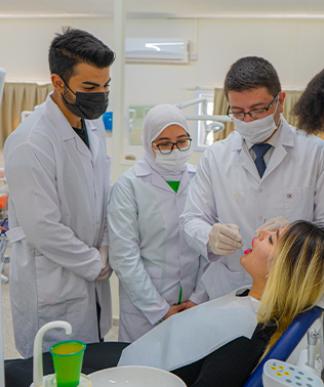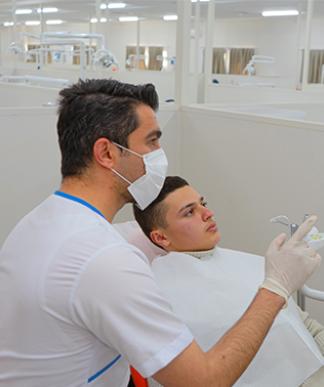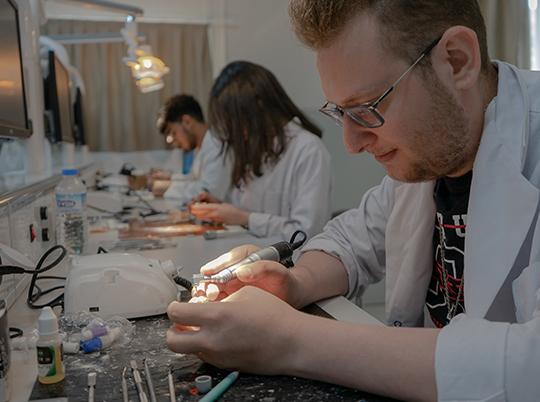


About the Program
The doctoral program of the Department of Periodontology offered by the Institute of Graduate Studies and Research at Cyprus International University aims to train dentists, who have been trained with contemporary and international opportunities, who prepare the most suitable periodontological treatment plan for hard and soft dental tissue losses, who have advanced periodontology knowledge and who follow current developments. The periodontology doctorate program trains dentists to have the clinical and scientific equipment to provide advanced health services to society, to plan and conduct original research.
Education Opportunities
The education in this program will provide advanced theoretical knowledge, clinical experience, and scientific/academic competence related to Periodontology, Dental Implantology, and Community Oral and Dental Health.

Career Areas
Graduates of the periodontology doctorate program can continue their academic life with the title of "Doctor of Science" or they can work in public or private sector organizations. They can also open their clinic or practice.
Contact
Institute of Graduate Studies and Research
Graduate Sciences and Education Center, GE106
Tel: +90 392 671 1111 Extension: 2776
Institute E-mail: ciu-institute@ciu.edu.tr
Compulsory Courses
First Semester
ADVANCED PERIODONTOLOGY-I
Course code
PERD601Credit
4Theoretical
4Practical
2Ects
6NON-SURGICAL PERIODONTAL TREATMENT
Course code
PERD603Credit
4Theoretical
4Practical
2Ects
6MUCOGINGIVAL SURGERY
Course code
PERD605Credit
3Theoretical
2Practical
2Ects
6AREA ELECTIVE
Course code
PERD7X1Credit
3Theoretical
3Practical
0Ects
10AREA ELECTIVE
Course code
PERD7X3Credit
3Theoretical
3Practical
0Ects
4Second Semester
ADVANCED PERIODONTOLOGY-II
Course code
PERD602Credit
4Theoretical
4Practical
2Ects
6SURGICAL PERIODONTAL TREATMENT
Course code
PERD604Credit
4Theoretical
4Practical
2Ects
6ORAL IMPLANTOLOGY
Course code
PERD606Credit
3Theoretical
2Practical
2Ects
4AREA ELECTIVE
Course code
PERD7X2Credit
3Theoretical
3Practical
0Ects
10AREA ELECTIVE
Course code
PERD7X4Credit
3Theoretical
3Practical
0Ects
4Third Semester
ADVANCED ORAL IMPLANTOLOGY TECHNIQUES
Course code
PERD607Credit
4Theoretical
4Practical
2Ects
6PERI-IMPLANTITIS TREATMENT
Course code
PERD609Credit
4Theoretical
4Practical
2Ects
6SEMINAR
Course code
PERD611Credit
0Theoretical
0Practical
0Ects
5AREA ELECTIVE
Course code
PERD7X5Credit
2Theoretical
2Practical
0Ects
10AREA ELECTIVE
Course code
PERD7X7Credit
2Theoretical
2Practical
0Ects
3Fourth Semester
DOCTORAL PROFICIENCY
Course code
PERD608Credit
0Theoretical
0Practical
0Ects
20AREA ELECTIVE
Course code
PERD7X6Credit
3Theoretical
3Practical
0Ects
10Fifth Semester
THESIS STUDY
Course code
PERD610Credit
0Theoretical
0Practical
0Ects
120CLINICAL STUDY IN DOCTORAL FIELD-I
Course code
PERD612Credit
0Theoretical
0Practical
0Ects
0Sixth Semester
CLINICAL STUDY IN DOCTORAL FIELD-II
Course code
PERD613Credit
0Theoretical
0Practical
0Ects
0Seventh Semester
CLINICAL STUDY IN DOCTORAL FIELD-III
Course code
PERD614Credit
0Theoretical
0Practical
0Ects
0Eighth Semester
CLINICAL STUDY IN DOCTORAL FIELD-IV
Course code
PERD615Credit
0Theoretical
0Practical
0Ects
0Elective Courses
MICROBIOLOGY AND IMMUNOLOGY OF PERIODONTAL DISEASES
Course code
PERD703Credit
3Theoretical
3Practical
0Ects
4ESTHETIC APPLICATIONS IN PERIODONTOLOGY
Course code
PERD704Credit
3Theoretical
3Practical
0Ects
4CLINICAL RESEARCH TECHNIQUES AND ETHICS
Course code
PERD707Credit
2Theoretical
2Practical
0Ects
3Entry Requirements
- The prospective student agrees that she/he shall apply to YÖK or YÖDAK for the equivalency of their undergraduate diplomas.
- The prospective student agrees that she/he shall apply to the Association of Turkish Cypriot Doctors in order to become a temporary member.
- The prospective international student agrees that she/he shall provide a Turkish Language Certificate or shall attend the Turkish Proficiency Test or shall study for a year for Turkish language education in order to continue their clinical studies. During their Turkish language study, students shall take one PhD course per semester for their PhD in Dentistry program.
- Prospective students agree that she/he shall provide an English Language Certificate (IELTS 6.0) or shall attend the English Proficiency Test which is organized by the School of Modern Languages. According to their success, students shall continue to the first year of the program or shall study the English language.
- Prospective students agree that she/he shall accept to work at least 20 hours per week during their PhD study and this clinical duty shall continue for 46 weeks per year.
- Prospective students agree that she/he shall accept buying clinical dentistry units with a written commitment.
- Surgery prospective students agree that she/he shall accept to comply with a two-semester (9 months) rotation duty in a full-fledged hospital.
- If necessary, Prospective students agree that she/he shall attend an online interview about the basic dental knowledge of the relevant field.
- Prospective students agree that she/he shall comply with clinical working programs with a written commitment.
- Prospective students agree that she/he shall comply with a written commitment to obeying professional and ethical responsibilities and not to cause malpractice conditions.
Cyprus International University provides academic scholarships for its students as an incentive for success, with most students benefiting from 50%, 75% or 100% scholarships or discounted tuition fees. Click for more information.
Tuition Fees are determined at the beginning of each academic year. Candidate students who are entitled to enroll in CIU can learn their fees in line with the Tuition Fee Calculation system.